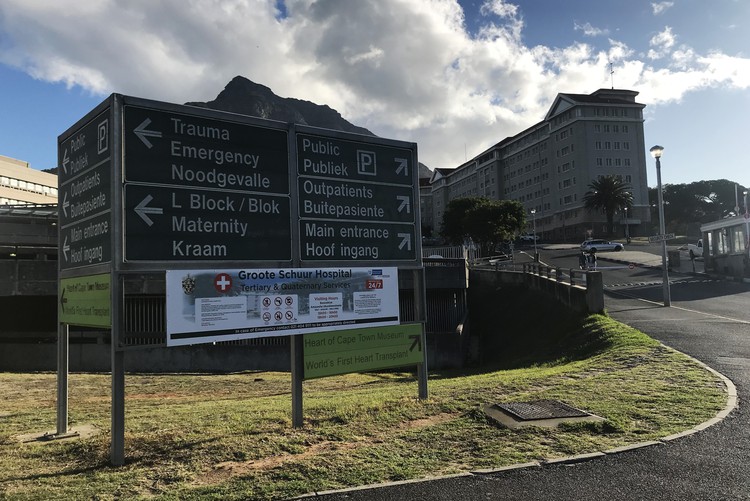
31 January 2024
Groote Schuur is one of South Africa’s biggest teaching hospitals. Archive photo: Ashraf Hendricks
Health workers at Groote Schuur Hospital and Red Cross Children’s Hospital in Cape Town are starting to feel the effects of an ongoing freeze on the hiring of critical medical staff.
According to senior officials at these hospitals, speaking to GroundUp anonymously, the situation has reached a point where managers are struggling to fill shift rosters. An impact on patient care and waiting times is inevitable, the officials say.
A senior hospital manager at Groote Schuur told GroundUp that almost half of medical officer (doctor) posts in the medicine department are vacant, in addition to hundreds of other nursing and operational posts.
Another senior official at Red Cross Children’s Hospital told GroundUp that “critical medical posts” are being left vacant, including medical officer, registrar (doctors in training for a speciality), and specialist posts.
Groote Schuur Hospital is one of the largest government hospitals in the Western Cape and Red Cross Children’s Hospital is the largest children’s hospital in Sub-Saharan Africa. The Daily Maverick reported in November that the budget shortfall for these two hospitals amounts to more than R300-million for 2023/2024.
In addition to hiring freezes at Groote Schuur and Red Cross, the Western Cape Department of Health decided to de-escalate services at the hospitals for a period of four weeks over December and January. Hospital managers were also told to reduce spending on consumables by 50%, according to the Daily Maverick.
At the start of 2023, large cuts were made to the conditional grants that fund these hospitals. And then in the middle of the year, National Treasury announced significant austerity measures including a R21-billion reduction in national government spending for 2023/24.
In August last year, a letter by National Treasury to provincial governments recommended several “cost containment” measures for the 2023/24 financial year and suggested a freeze on hiring of new employees.
It appears that each province’s health department is dealing with the “cost containment” measures in different ways. In the Eastern Cape, for example, hiring freezes have been implemented but not for clinical staff, Sizwe Kupelo, spokesperson for that province’s health department, told GroundUp.
In the Western Cape, as of May 2022, the vacancy rate of medical posts was 5%, compared to 14% in the Eastern Cape, 20% in Gauteng and 28% in KwaZulu-Natal. Health experts are concerned that budget cuts and hiring freezes will have a devastating impact on these provinces.
Hospital officials at Groote Schuur and Red Cross told GroundUp that there has been a lack of clarity from the provincial department on how long hiring freezes will last and whether there will be a permanent reduction in medical posts.
Senior officials fear that the hiring freeze is undoing decades of investment by the government in the capacity of state hospitals. Newly graduated doctors looking to specialise need to take up a registrar post in a state facility, but with registrar posts frozen in the Western Cape, this is almost impossible for them to do.
Hospital managers told GroundUp that some medical officers have resigned from Western Cape hospitals to take up registrar posts in other provinces or even other countries.
Officials are also concerned that if hiring freezes are implemented in primary and secondary care facilities, referrals to hospitals will increase, putting further pressure on an already overburdened tertiary health system.
Dwayne Evans, spokesperson for the Western Cape Department of Health, told GroundUp that the department is unable to respond to specific questions on budget shortfalls or the number of posts frozen, as the 2024/25 budgets are being finalised.
Evans told GroundUp that as part of the hiring freeze, the filling of vacant posts now needs to be authorised by the provincial department to attain “provincial consensus”. 820 vacant nursing posts and 441 doctor positions have been “earmarked to be filled soon”, Evans said.
“We are doing everything we can to reduce the impact on our patients. No patients will be refused emergency and basic medical care and treatment,” he said.
The National Department of Health did not respond to GroundUp’s questions despite several follow-up attempts. National Treasury said that guidance will be given during the upcoming budget speech by Finance Minister Enoch Godongwana.